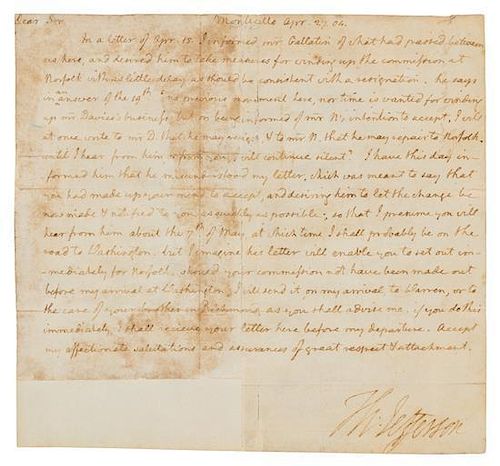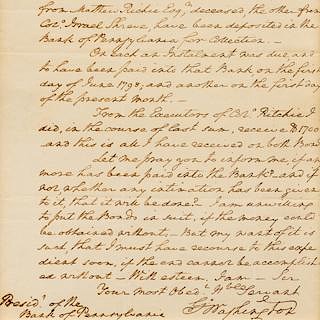* JEFFERSON, Thomas (1743-1826). Autographed letter signed ("Th. Jefferson"), as President, to Wilson Cary Nicholas, 27 April
Lot 417
About Seller
Hindman
1338 West Lake Street
Chicago, IL 60607
United States
Recognized as the Midwest's leading fine art auctioneers, Hindman Auctioneers has built a worldwide reputation based on a full service approach to the auction business tailored to meet the individual needs of our clients. Coming from a variety of educational backgrounds, specialists bring years of e...Read more
Categories
Estimate:
$6,000 - $8,000
Absentee vs Live bid
Two ways to bid:
- Leave a max absentee bid and the platform will bid on your behalf up to your maximum bid during the live auction.
- Bid live during the auction and your bids will be submitted real-time to the auctioneer.
Bid Increments
| Price | Bid Increment |
|---|---|
| $0 | $25 |
| $500 | $50 |
| $1,000 | $100 |
| $2,000 | $250 |
| $5,000 | $500 |
| $10,000 | $1,000 |
| $20,000 | $2,500 |
| $50,000 | $5,000 |
| $100,000 | $10,000 |
About Auction
By Hindman
May 1, 2018
Set Reminder
2018-05-01 11:00:00
2018-05-01 11:00:00
America/New_York
Bidsquare
Bidsquare : Fine Books and Manuscripts
https://www.bidsquare.com/auctions/hindman-auctions/fine-books-and-manuscripts-3113
Hindman Bidsquare@hindmanauctions.com
Hindman Bidsquare@hindmanauctions.com
- Lot Description
* JEFFERSON, Thomas (1743-1826). Autograph letter signed ("Th. Jefferson"), as President, to Wilson Cary Nicholas. Monticello, 27 April 1804.
1 page, 4to, browned, central area with glue stain showing through from old fold repair on verso, lacking approximately 1-inch section of lower left corner, laid down; mats and frames available. Writing to a close personal friend and political associate regarding his appointment as collector of the port of Norfolk following his term as Senator-and before his return to Washington as Congressman in 1807.
"In a letter of Apr. 15. I informed Mr. Gallatin of what had passed between us here, and desired him to take measures for winding up the commission at Norfolk with as little delay as should be consistent with a resignation… I have this day informed him that he misunderstood my letter, which was meant to say that you made up your mind to accept, and desiring him to let the change be now made & notified to you as quickly as possible, so that I presume you will hear form him about the 7th of May, at which time I shall probably be not eh road to Washington. but I Imagine his letter will enable you to set out immediately for Norfolk…. Accept my affectionate salutations and assurances of great respect & attachment…."
Wilson Cary Nicholas (1761-1820), residing in Albemarle County, Virginia, had served in the Revolution and became commander of General Washington's Life Guard. Elected to the House of Delegates in 1784, he supported Madison's stand for religious liberty and championed the adoption of the Federal Constitution. He became an ardent Jeffersonian, worked with Jefferson and Madison in the formulation of the anti-Federalist Virginia Resolutions and in 1799 was elected to the Senate, where he served until 1804, when he resigned to become collector of the port of Norfolk 1804-1807, then returned to Washington as a Congressman in 1807. He corresponded with the President on the subject of the Constitutionality of the Louisiana Purchase, and in 1809 was a principal organizer of Madison's Presidential candidacy. In 1814 he was chosen Governor of Virginia. He collaborated with Jefferson in the organization and founding of the University of Virginia, and was briefly head of the Richmond branch of the Bank of the United States. In 1819, due to heavy speculations in frontier real estate, he defaulted on a $20,000 debt which his old friend Jefferson had endorsed on his behalf, causing considerable distress to his political mentor (see Dumas Malone, Jefferson and His Time; The Sage of Monticello, 1981, pp.302-305, 309-14). Nicholas died in virtual poverty in October 1820 and was interred in the graveyard at Monticello.
Estimate $ 6,000-8,000
Property from the Robert L. McKay Collection, North Tustin, California
- Shipping Info
-
For more information regarding shipping please visit Leslie Hindman Auctioneers' Shipping and Packing page.
-
- Buyer's Premium



 EUR
EUR CAD
CAD AUD
AUD GBP
GBP MXN
MXN HKD
HKD CNY
CNY MYR
MYR SEK
SEK SGD
SGD CHF
CHF THB
THB











